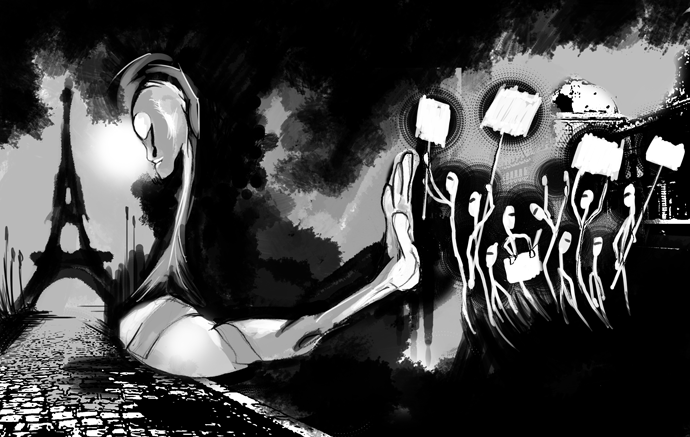Paris has loomed large in my mind the past few months. In Paris, on Nov. 30, the COP21 climate talks will convene. These talks must succeed. If they do not (it has never really been more than a fool’s hope that they will succeed in any meaningful way) then we do not have a snowball’s hope in hell of avoiding the worst, most catastrophic effects of climate change.
My hope for the success of the talks did not die with the terrorist attacks of Nov. 13. It died on Nov. 19, when I read that French authorities had banned all large marches and demonstrations which had been planned to coincide with the conference.
Hundreds of thousands had been expected to participate in demonstrations in Paris itself, with hundreds of thousands more in cities around the world. This is to be expected for such important talks on such a grave matter concerning all people. Their presence would have been the only thing to allow for the possibility of success. Without the democratic awe inspired by such a mass of people at their doorstep, what is the motivation of world leaders to commit to sacrifices, to travelling the hard roads ahead?
The plans to reduce greenhouse gases so far submitted in preparation for the conference, added up, still result in an increase in temperature of more than two degrees Celsius. This is the kind of commitment that occurs without broad and heavy pressure in the streets: half-measures, scarcely better than nothing.
Streets full of angry protesters saying that half-measures are not acceptable in the face of impending ecological collapse might have made the leaders present in Paris reconsider, realize the gravity of our situation, commit to meaningful targets, and actions to meet those targets. There is absolutely no chance that this will happen with the streets devoid of unrest. With dissenting voices removed from the streets, it will be easy for them to come away from Paris patting themselves on the back, no matter how little is accomplished.
Once upon a time, the French were known to possess a certain sangfroid in face of political violence; no more. They desire safety now above all else. It’s not just the French – the West in general will do anything for safety. That’s why we’re treated as criminals at airports, why we’re eager to have our governments spy on us.
Citing the example of a mass panic at the Place de la République (a false alarm, caused by a firecracker, where no one died) on Nov. 15, political demonstrations are banned, as part of a general extension of emergency powers.
There is always a risk of bombings, shootings, violence, and stampedes at large gatherings of people. You don’t need terrorism (recent or potential) for demonstrations to turn ugly, as was seen in the rioting in Seattle in 1999, or the stampedes during this year’s tragic Hajj. That’s why such events – be they official conferences or associated protests – have large police presences.
The police in France have, in wake of the recent attacks, been granted extraordinary powers. Many people (presumably, the most likely to actually carry out more terrorist attacks) have been arrested in raids. The French are calling for tighter restrictions on Europe’s borders. Are these new measures not up to guaranteeing safety in the streets? What exactly is the nature of the French state that it chooses to ban public demonstrations by all, because of the actions of so few?
Universal guarantees of security are impossible at the best of times. To prohibit large public demonstrations at the time of a hugely important global conference because of a supposed risk of mass panic or bombing bears no balance to the potential danger.
People can still convene – inside of buildings or places where security can “easily be ensured.” Although this may genuinely be intended to guarantee demonstrator safety, this is also exactly what a government eager to stifle dissent or shows of opposition would do.
The French, of all people, should know that you don’t need to be a terrorist to get riled up and throw a few bricks in a fit of political passion. If ever there was a time to get angry, to be loud in demands – to do exactly what the French government has prohibited – it would have been in Paris.
There will be no masses of people to stampede, no masses of sitting targets. There will also be no opportunity for black bloc demonstrations of the kind that usually occurs in large protests. It’s hard to remain anonymous inside a building. In this day and age, you don’t need to be a terrorist to want to remain anonymous while protesting; governments do not have a great track record dealing with environmental protestors. And now, one has to wonder, will anyone assembling in the street be automatically arrested as a criminal?
All for the best, I suppose; it would be most unseemly if a group of angry people tried to erect barricades in the streets of Paris. The spectacle which will occur on Nov. 30, as the conference opens, will be heartbreaking. Rather than the great chorus of people demanding, begging, pleading for action and commitment to protect our common home, there will be a muted whimper, all that the leaders of our dying culture are apparently willing to allow from the masses.
The victory of terrorists does not come from 130 people dead. The victory of terrorists comes from the stifling of the voices of hundreds of thousands. That most terrible flower, sprung from the seed of evil, and watered with the blood of the innocent: “safety” will bloom in the streets of Paris, as November dies.



